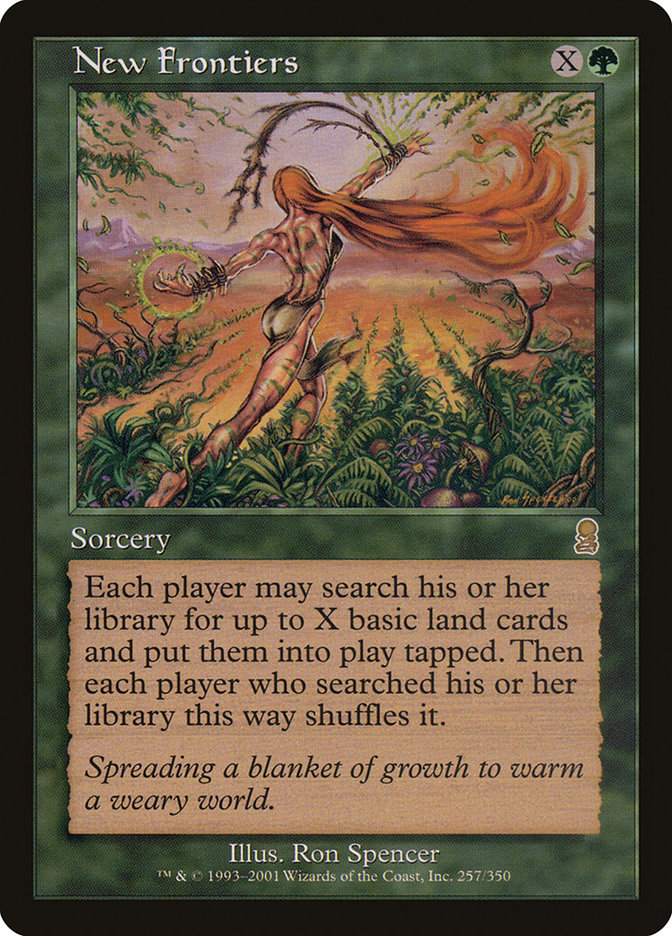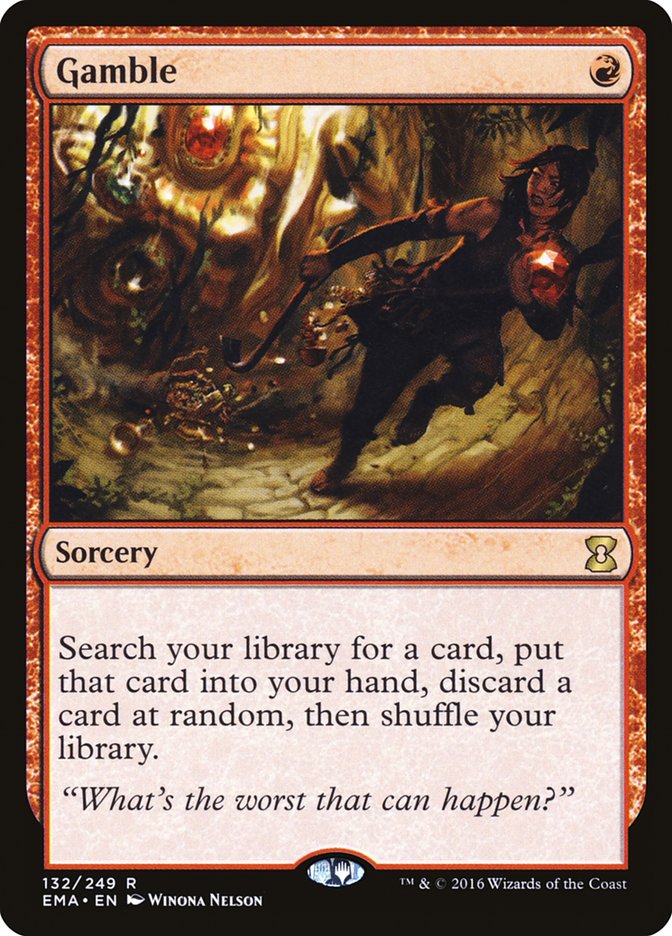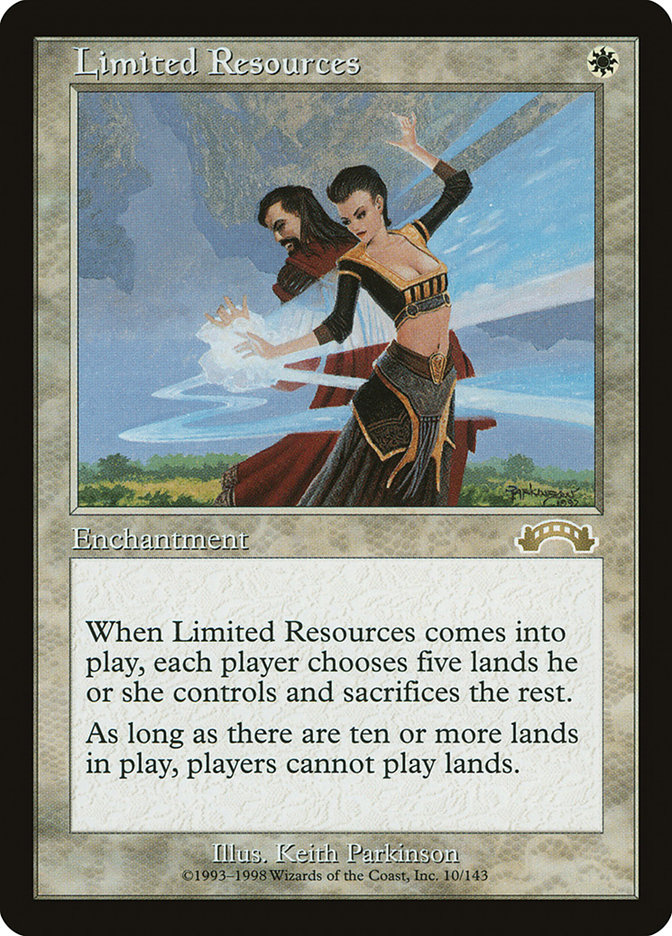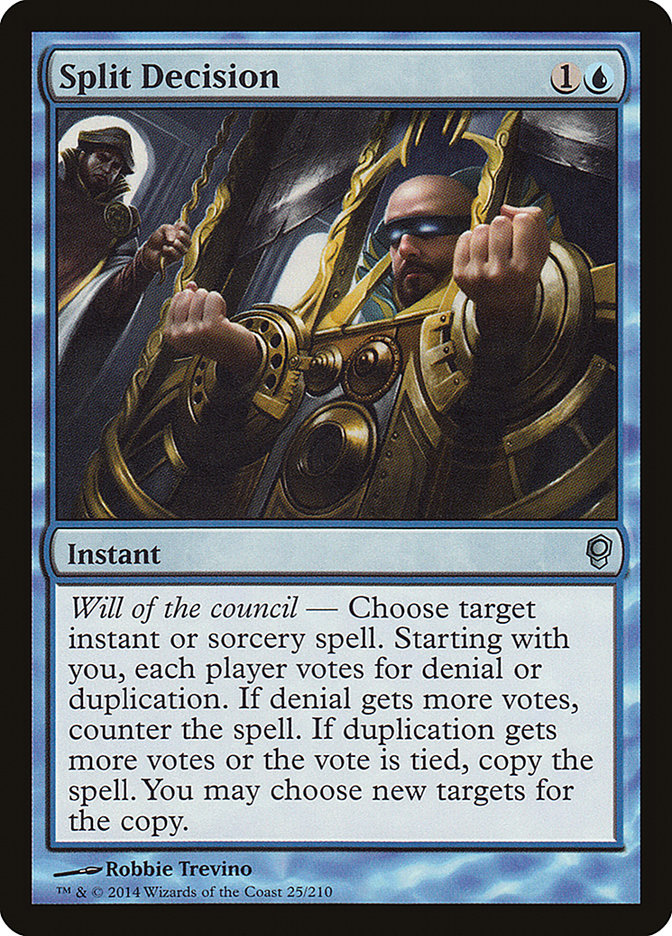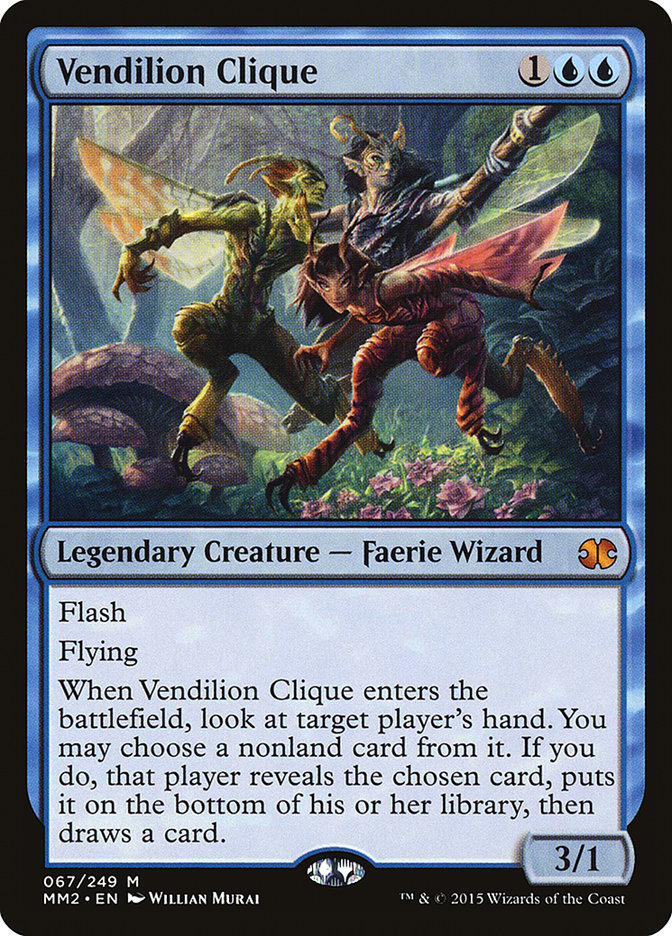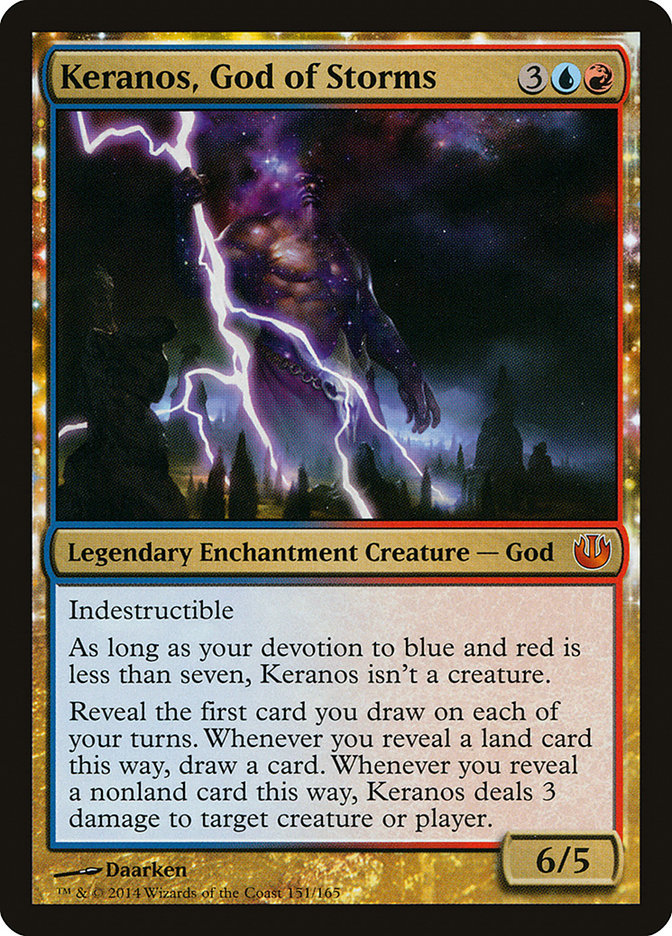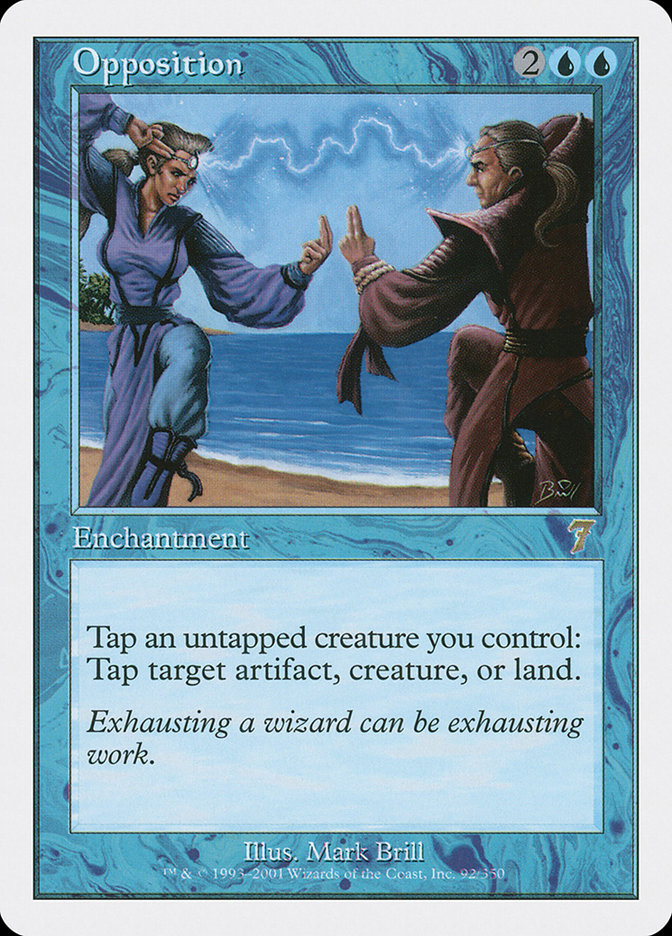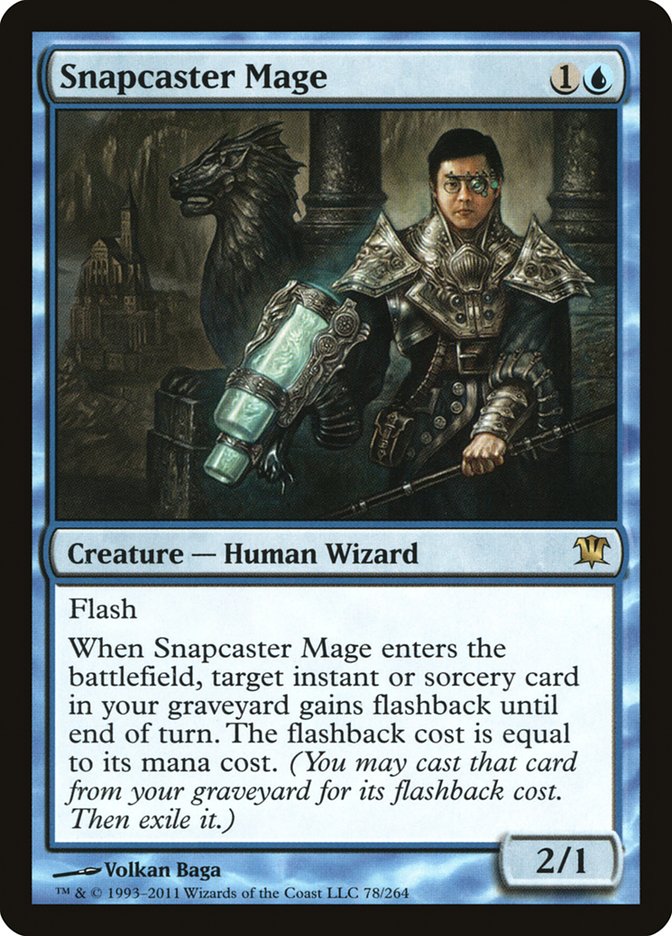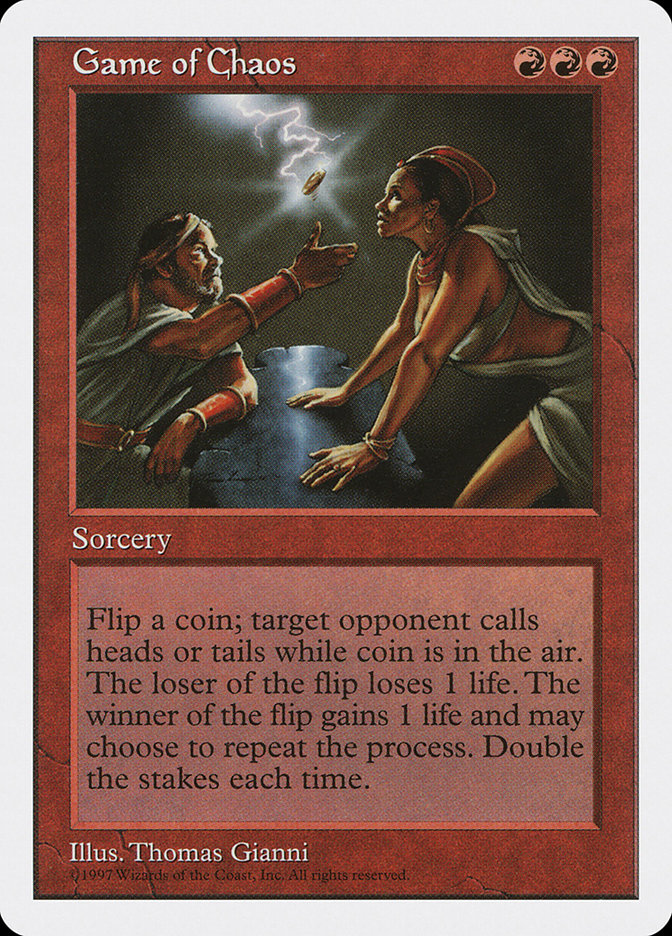Even the Ghostbusters had to cross the streams to beat the Stay Puft Marshmallow Man.
Crossing the streams when it comes to gaming is important if you want to breach that “wall.” Every so often, someone will ask me what it takes to become a great Magic player. I reply, “How should I know? I’ve been trying for over a decade now!” But in all seriousness, it is easy to get stuck in a rut, and playing a different game for a little while is a great way to refresh your brain so that you can look at the problem from a different angle.
We often get too close to the things we love, making it difficult to see the answer right in front of you. Sometimes it takes a different teacher to make you understand the same concept you’ve been trying to figure out for the last month. Switching between Magic and other games isn’t just helpful; I think it is healthy. You shouldn’t go to the gym just to make your arms bigger. You want to make your whole body stronger. So then, why wouldn’t you do everything in your power to exercise your entire brain?
Using other games as a jumping-off point is also a smart way to introduce newer players to the game of Magic. If you weave together enough concepts from the games they already play, explaining basic theory becomes a snap. However, if you move head-first into the subject of Magic: The Gathering, we all know it can be a complex animal. At times, I stop myself mid-conversation and just think about how ridiculous I sound to all the people around me.
People play other games. We want them to play Magic. Mixing the two can only lead to more people playing Magic (since we know no one can actually quit).
Tournament Poker
Many of you have played poker, but I’m willing to bet that not too many of you have played a poker tournament. Each player starts with the same amount of chips, much like starting with the same life total in Magic. For each hand that is dealt, some number of players (usually two) are required to put up a “blind.” This is a forced bet at the beginning of each hand, and rotates around the table. In a tournament, to prevent people from just folding 99% of hands, waiting on hitting a perfect starter, the blinds increase over time.
Blinds put pressure on players to make decisions.
While the game of Magic itself does not put pressure on the players to act, it would behoove you not to get too comfortable. After all, the opponent will probably start pressuring you soon enough. But like in Magic, the other players in poker are trying to attack you. Perhaps not directly at first, but once you and that person are the only players left in the hand, every bet made is an attack. Every call or fold is a form of defense. You want to protect your chips, but you also want to use them to accumulate chips from the rest of the players. In Magic, we see this with our life totals quite a bit. Players will use their life total to buy time or generate card advantage.
In a poker tournament, chips are your greatest resource. They’re your only resource. You have to use them to play defense and offense. You need to use your larger stacks as a deterrent from people trying to bluff you out of winning more chips. You need to use your smaller stacks more aggressively to put pressure on medium-sized stacks.
Every action in poker has meaning behind it, even if that is “I’m a crazy person.” People make mistakes, and those people are often punished for them. But the great thing about both poker and Magic is that there is a good element of luck in both. Even if you screw up, you still have a chance to win. Some people may complain about the variance in either game, but let’s be real: that’s what keeps us coming back. The sweat is what makes Magic, and poker, exciting.
You’d be pretty surprised what else Magic and poker have in common.
I would compare each starting hand in poker to a mulligan decision in Magic. In Magic, taking a mulligan can be a boon. After all, you don’t want to be forced to keep a one-lander. “Hand selection” in poker, or choosing which hands you play, is as important as knowing what hands to mulligan in Magic.
The major disconnect here is that many more hands in Magic are considered keepable than in poker, but many of the principles remain the same. If you have very few chips left compared to the size of the blinds, you could easily compare that to a mulligan to six cards. Now, your range of hands that you have to keep is much higher, because going to five cards is so detrimental.
In poker, folding a medium or decent hand when the blinds are very high and your chip stack is very low is the equivalent of a mulligan to five because you had four lands. It could be right, or it could be wrong. It all depends on the situation, but your range of keepable hands should increase or decrease based on outside factors. If you’re playing against an aggressive deck, keeping a starting hand of five lands and two cards that cost six mana is a pretty bad idea. Just like in poker, it can be very dangerous to get invested in a weak hand against a strong, aggressive player.
Bluffing at certain points is essential for success in poker, but isn’t as easily applied in a game of Magic. In a lot of spots, bluffs in Magic make the person applying said bluff look like a genius, simply because of how rare spots like that actually come up. In Draft or Sealed Deck, bluffing a pump spell or removal spell is much more likely than in Constructed, but there are certain decks and situations where a bluff is the only thing that’s going to win you the game.
And sometimes it works.
But the main reason why bluffs are so rare in Magic is that the stakes tend to be much higher (obviously not monetarily, but situationally). Getting your bluff called in Magic usually means you lose on the spot. That’s why big bluffs in Magic (caught on camera) are so special. And also unlike Magic, you have the rest of the table as a threat to anyone who is trying to “call your bluff.” If they call your bluff, someone else could have a much better hand and just attack them back. That makes it much less appealing to call your bluffs unless everyone else has folded their hand.
In poker, bluffing is a huge part of the game because the risk is so small compared to what you’re trying to win. Each hand, you have the potential to bluff and win a bigger pot than what you’re betting. But bluff too much and the rest of the table will catch on, which means they’ll increase the range of starting hands needed to instigate a battle. But the main reason why bluffs are such a big part of tournament poker is that it is very possible that you don’t get a “good” hand to play before the blinds eat away most of your chip stack.
The true skill of tournament poker is putting yourself in the best position to win the tournament regardless of the starting hands you’re dealt. Obviously it helps to get dealt pocket aces a bunch, but you can’t be too reliant on that. Much like in Magic, you won’t always start with the best possible hand, but you have to find a way to win regardless.
Timing is another big crossover between Magic and poker, and can most easily be explained by the card Vendilion Clique. Many people misplay Vendilion Clique, but it can be a valuable asset. Vendilion Clique represents the ability to put pressure on your opponent in two different ways and can be cast whenever you want. Sometimes, casting it during your opponent’s draw step is big, because you can take away whatever their best play for the turn could be. However, knowing when to save your Vendilion Clique for a more valuable spot is key in understanding exactly what the card can do.
Since Vendilion Clique puts pressure on your opponent in two different ways and can be cast on your opponent’s turn, you can use it to initiate a fight that the opponent might not want to have. You can force them to deal with it on your terms, allowing you time to resolve a potentially more important spell on the following turn. And since it can be played at instant speed, you are in control of when you cast it. Starting a fight right before you land a Keranos, God of Storms can be big, but making sure you can protect your Vendilion Clique is important if it is your only threat.
In poker, timing your bets at the right moments can also be big, because every action you make tells a story. If you bet when an ace hits the board, you are telling your opponent that you have an ace in your hand. Subsequently, if you don’t have an ace in your hand, betting in this spot could be a valuable bluff, albeit dangerous. Your opponent calling your bets tells just as much of a story as you betting, and figuring out the story is how you win the hand (or get out of the hand without losing more chips).
While tournament poker and Magic have a lot in common, there are just as many parts that they do not share. When trying to do cross-overs between games, figuring out which pieces to extract information from is the most difficult part. I don’t want you coming away from this thinking you should try bluffing more in Magic. Odds are you aren’t going to be able to pull it off. But being able to see the spots where you could bluff, and then figuring out when to deploy those bluffs, could be the difference in you qualifying for the Pro Tour or winning your first tournament.
Hearthstone
This is one I’m not exactly comfortable with talking about, because it just so happens to be a major competitor to Magic Online, but it is a game that a lot of people play. I think that comparing the two, at least on a fundamental level, is okay if you understand one thing: I don’t condone playing Hearthstone over Magic. I think the game is fun, and there are certainly a lot of positive aspects, but Magic is a better game. For me, there will never be a substitute for Magic, and just because a game tries to emulate a bunch of the positive aspects of Magic while cutting out some of the negative ones does not make it “better,” only different.
In actuality, I dislike the fact that you are never “safe” in Hearthstone. In Magic, if you take control of a game, you generally have a turn or two to breathe, because your opponent will likely draw a land or other resource card some of the time. In Hearthstone, every single topdeck is going to be a spell that you have to deal with in one way or another, and that is terrifying. It leads to a solid viewing experience, but it is much less attractive to me from a game-design aspect.
But since Hearthstone draws a lot of its design from Magic, there are a ton of things you can learn from each that cross over. While the combat system is a bit different, as no creature can “choose” to block and creatures can directly attack each other (and damage is permanent), the concepts of combat in each game can help you learn how to optimize in each.
In Hearthstone, it is often valuable to make positive trades against your opponent’s creatures. By that I mean if you have a 3/3 creature, and they have a 2/3 creature, it is mostly a no-brainer that you should kill their 2/3 and keep your creature around (now a 3/1). This is mostly to prevent that 2/3 creature from attacking your 2/2 or 2/1 creature later in the game.
But like in Magic, everything about Hearthstone combat is situational. If your opponent is at a low life total or will be forced to attack your creature anyway, then it will often be correct to attack the opponent directly. In Magic, the same skill can be applied when trying to figure out if you should make an attack that will lose you a creature “for free” or make a trade in combat that will ultimately give you a better battlefield position later down the line.
I’ve found that in Magic, players don’t really like to trade their creatures off in combat and will regularly settle for building up both sides of the battlefield until it becomes a tangled mess. When games reach that point, it is often impossible to figure out what creatures should attack unless they have some sort of evasive ability (flying, shadow, etc.).
Making trades early to simplify a battlefield state can have value in and of itself, as it leads to you being able to more easily navigate through the game. If there are too many permutations on how you could attack or your opponent could block, it could lead to a stall in the game and ultimately a draw in the match.
Of course, trading a great creature with strong abilities for a mediocre creature with similar power and toughness is not exactly desirable, but you’d be surprised how often you’ll see me do something like that, just so I can kill my opponent three or four turns down the line with a Snapcaster Mage.
Hearthstone also has a different type of resource system from Magic, giving players a “free land” every turn (to a maximum of ten) but starting each player off with fewer cards in their opening hand. This aspect of Hearthstone makes building decks much easier, but it also detracts from the players from mixing various factions to make unique decks.
Mana is one of the most important parts of building a Magic deck, and while many see that as a boon for Hearthstone, I see it as a drop in potential creativity. But having this “free mana” system in Hearhtstone can unlock your creative juices when it comes to Magic. When you see what you can do in a game of Hearthstone with “perfect mana” every game, it might lead you to be more adventurous with your manabase in Magic. Even if you fall on your face, at least you’re trying something new.
And with that resource system in place, comparing things like “curving out” or utilizing the most mana each turn becomes easier to relate. The two games are similar enough that they can be compared on a lot of levels, but different enough that each feels unique.
Each faction has a “hero power” which acts as a mana sink, giving you the ability to affect the game in some way, even if your hand doesn’t allow you to make a play. In Magic, mana sinks are important for exactly the same reason. These mana sinks also allow you to accrue more resources, apply more pressure, or provide some amount of defense without using more resources from your hand. If your opponent could threaten a mass removal spell, having a way to use your mana that doesn’t cost you resources is huge. If you understand this concept in Magic or Hearthstone, it can be much easier to translate between games.
One major difference I’ve seen in design theory between the two games is that Hearthstone incorporates a much greater sense of randomness. Certain cards or abilities will fling damage wildly, but you can often control (to an extent) where that damage is going to go. The downside to this type of design is that it can result in many “feel-bad” moments for both players, but great game designers understand that randomness is important if you want to make a truly great game. If every game played out the same each time, it wouldn’t be very fun.
But this sense of randomness also teaches you to eliminate as many variables as possible before employing said random card or ability. Making sure your spell that “destroys a random creature an opponent controls” becomes Doom Blade if you’re able to remove the rest of their creatures from play. In Magic, there aren’t a lot of spells that use this amount of randomness, but learning to eliminate variables is a huge stepping stone to becoming a great Magic player.
Playing in certain ways to eliminate potential outs from the top of your opponent’s deck is exactly the same thing. Once you understand that every game we play will likely have some amount of variance involved, you should worry about playing in such a way that it gives you the best possible chance to win. Countering an innocuous spell early in a game could buy you enough time to actually take control before your opponent is able to get a relevant threat to stick. Blocking in such a way that you take yourself out of Lava Axe range when your opponent is playing red in Limited can make all the difference.
Not Seeing the Forest for the Trees
Understand the similarities between these other games that you are playing and Magic, and try to bring some of that knowledge back. Become better at drafting by playing 7 Wonders. Learn how to manage complex battlefield states by playing Dominant Species. Become stronger at politics and Commander by playing Risk. Make your mom scream by playing Cards Against Humanity with your aunt and uncle. Regardless, have some fun, and stretch your brain out a little.
So often in this career, I feel like I get a little too close to the game of Magic. I spend too much time worrying about my decklists from week to week and lose sight of the bigger picture. I can’t “see the forest for the trees.” And when that starts to happen, it is important to take a step back and re-evaluate.
That’s what I’ve been doing a lot recently. I’ve skipped a few tournaments because I’m trying to figure out what I actually want this to mean. I’ve forgone attempts at qualifying for the Pro Tour in favor of grinding it out on the SCG Tour®. After losing in the finals of the Players’ Championship to Jim Davis, I wanted nothing more than to get back on that stage and beat him this time around. But the traveling, the pressure, week in and week out, was and is taking its toll.
Don’t take this the wrong way. I haven’t given up. I could still take my shot at the Player’s Championship in the third season, or just spike an Invitational. But for now, in the coming weeks, I’ve decided to stop going to tournaments every weekend. When I want to go, I’ll go. And maybe, when I do decide to come back ’round, I’ll be ready. Going through the motions over the last month has left me jaded. I wanted it, but I didn’t really “want” it that badly, or I would have put more time and effort into preparation.
Instead, I’m working on me for a while. I’m taking a breath. And when I exhale, I’ll be back.


